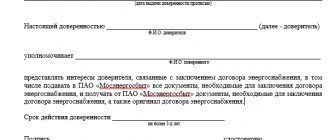In this article we will talk about why a notarized power of attorney is not required when voting at a general meeting of SNT members according to Law 217-FZ. The question arises very often, so we decided to prepare an article on this topic with a detailed legal basis and offer the author’s sample of a power of attorney for voting in SNT. Before answering this question, let’s understand what a power of attorney is, in what form it is drawn up, for how long it is concluded and in what cases it must be certified by a notary.
What is a power of attorney
A power of attorney, in accordance with Article 185 of the Civil Code of the Russian Federation, means a written document on the basis of which one person authorizes another or several individuals at once to represent his interests and carry out legally significant transactions with third parties.
According to civil law, this is a one-sided type of transaction. There is no need to obtain the consent of an attorney to carry it out. The representative may act during the period specified therein only in the interests of the principal.
A power of attorney, depending on the powers specified in it, can be one-time, special or general.
Power of attorney for the sale of an apartment: sample, with and without the right to receive money, how to draw it up
Last changes: January 2020
To avoid unnecessary hassle, owners are increasingly issuing a power of attorney for the sale of an apartment to any legally capable person (relative, friend, acquaintance, co-worker and other third party).
When selling an apartment, the owner has to go through a lot of manipulations.
Collect a voluminous package of documents, select a potential buyer from the found applicants, conclude a purchase and sale transaction, make payments on it, and finally register the agreement in Rossreestr.
A power of attorney is a document according to which the principal assigns specific powers to another person to carry out transactions on his behalf and represent his interests before other persons.
Document Format
The differences between powers of attorney depend only on the number and form of powers vested in the attorney and, accordingly, the cost depends on this.
So notaries distinguish three types:
- one-time – covers a specific (limited) range of responsibilities of the trustee (without the right to sell the property);
- special - issued to an authorized person to carry out similar actions within a specified period of time (representation in court, receiving funds from a banking institution, etc.);
- general - involves a wide range of powers, giving the right to the authorized person to perform any actions on behalf of the principal (manage property, carry out transactions with it (alienation, purchase, inheritance, lease, etc.), carry out all permissible manipulations with deposits in the bank, represent interests in courts of various ranks)).
For the sale of a specific object, both a one-time and a general power of attorney for the sale of an apartment are issued, depending on the permitted actions listed above. To issue a general power of attorney, you will need similar documents that are necessary when registering any type of power of attorney. (see also: What documents are needed to sell an apartment)
Where to issue a power of attorney for the sale of an apartment
Any form of power of attorney is subject to mandatory notarization. To do this, you should contact a notary office.
In a number of cases, the law provides for exceptions in relation to the witness:
- senior management of the military unit (if the principal is a military personnel);
- head of the colony (if the principal is a prisoner);
- head of a gerontological institution;
- chief physician of a medical institution, etc.
According to Article 185.1 of the Civil Code, such powers of attorney are equivalent to those certified by a notary.
The power of attorney must indicate the personal data of the principal and the authorized person.
In addition, it is worth indicating the following information:
- date, place of preparation and certification;
- information about the alienated object or its shares;
- indication of specific bodies to contact and visit which authority is given;
- with the right to receive money from the buyer;
- without the right to receive money from the acquirer of the object;
- whether the right of subrogation is provided or not;
- validity.
The power of attorney can be either a one-time power of attorney, issued for one day, or with a maximum permissible validity period of three years.
Individuality of the power of attorney for the alienation of real estate
Each transaction involving the alienation of an apartment is individual in nature, which cannot but affect the list of powers in the power of attorney, the indication of which is mandatory. There are situations where before alienation in a transaction it is necessary to carry out specific actions, without which the procedure for selling an apartment is impossible.
For example:
- The apartment has been remodeled, but without approval. To do this, it is worth legitimizing it through the court, which requires representation, which is indicated in the power of attorney.
- The owner or owner-co-owner of the property is a child who has not reached the age of majority. Why is it necessary to represent his interests in the guardianship authorities, with a notary, etc. In this case, it is necessary to indicate such a clause in the power of attorney.
- There is only an early certificate of ownership for the apartment (the data is not included in the Russian Register, it is worth obtaining a new extract from the Unified State Register of Real Estate).
In any case, all this is discussed before certification.
Documents required for preparation
A citizen who is going to issue a power of attorney is obliged to visit the notary's office in person or invite a notary to his home (in case of force majeure - illness, etc.). He must have with him the identity cards of both parties and confirmation of the right to the property (certificate, extract from the Unified State Register of Real Estate).
If an apartment is owned by a minor, a power of attorney has the right to be issued by a guardian or parent.
Important! In this case, the presence of the child is not necessary. Only upon reaching the age of fourteen does the minor owner have the right to sign an agreement for the alienation of real estate, but only in the presence of a legal representative.
The following documents (originals) are required for this::
- confirming the identity of a minor (birth certificate (up to 14 years), birth certificate and passport (from 14 to 18 years);
- ID card of the parent or guardian (trustee);
- confirming the right to guardianship;
If the owner is an incapacitated citizen, his interests are represented by a guardian:
- ID card of the incapacitated person;
- identity document of the guardian (trustee);
- confirmation of the right to guardianship (trusteeship).
If the object of alienation is listed as shared ownership (several owners), then when signing (certifying) a transaction with it, the law requires the provision of official consent of all participants in the transaction (certified by a notary).
When alienating a piece of real estate owned by spouses, the consent of the spouse (notarized) or his personal presence is provided to draw up a power of attorney.
An exception is the purchase of housing in the case of:
- object inheritance;
- by deed of gift;
- a valid marriage contract, which clearly states that the consent of the other is not required.
Consent is also necessary if the property is involved in a divorce dispute.
Price
The pricing policy for trust documents is different and directly depends on the type, list of specified powers, and the region in which the notary’s office is located. The only general condition is the state fee, which must be paid there after the power of attorney is issued.
Approved tariffs are posted directly on the stand in the notary's office or on the office of the Notary Chamber of the region. They are approved by the minutes of the meeting of the notary chamber of the region where the notary himself is registered, and cannot be changed by him.
Thus, the cost of a one-time power of attorney varies from 800 to 1200 rubles (excluding state duty). Special – from 1200 to 1800 rubles. As for the general one, it’s impossible to say with certainty.
Its cost depends on many facts. Will the cost of the alienated object be indicated? If yes, then the cost directly depends on this. What powers are entrusted to the duties of the attorney, etc.
Duration and invalidation
What period of validity will be provided for the power of attorney is decided only by the principal himself. If the period is not specified, then it will be valid until one year from the date of preparation (clause 1 of Article 186 of the Civil Code).
If the date of its commission is not indicated, it will be considered void.
Also, a power of attorney is considered invalid (void) if age and other criteria are not met:
- the principal has not reached fourteen years of age;
- the principal signed it in the absence of a legal representative (if he is under 14-18 years old);
- the person is incompetent (court decision);
- validity period has ended (invalid);
- the registration was made under pressure, or the person was in a state of passion, etc.
The validity or cancellation of the power of attorney can be checked on the website: reestr-dover.ru
Selling a property by proxy without the owner, you can run into big troubles. Both the principal and the future owner face these risks. This most often happens when the principal gives authority to complete a transaction to a non-reputable real estate agency.
This happens when a general power of attorney is issued, where the authorized person is given the right to do everything: collect documents, alienate, receive a sum of money, etc. Therefore, before you formalize it, you need to seriously consider choosing a candidate for the role of attorney. It is better to grant such powers to close relatives or trusted friends.
An acceptable option when choosing the type of power of attorney would be a one-time power of attorney. Where the clause on the validity period will be indicated - the period expires immediately after submitting the documents to the registration authority. After this, the attorney will not be able to manipulate the property.
Also, the transaction is entrusted to a notary, but for a fee, respectively.
Free question to a lawyer
Need some advice? directly on the site. All consultations are free / The quality and completeness of the lawyer’s response depends on how completely and clearly you describe your problem:
© 2020 zakon-dostupno.ru
Source: https://zakon-dostupno.ru/nedvizhimost/kuplya-prodazha/doverennost-na-prodazhu-kvartiryi/
In what cases is a power of attorney certified by a notary?
In accordance with Article 163 of the Civil Code of the Russian Federation, all transactions between individuals are certified by a notary in cases where this is directly stated in the law.
In accordance with clause 1 of Article 185.1 of the Civil Code of the Russian Federation, a power of attorney must be certified by a notary in cases where transactions are made:
- when submitting applications for state registration of rights or transactions;
- by order of those registered in the state. rights registries.
This could be, for example:
- marriage contract;
- real estate alienation agreement;
- property donation agreement;
- will of property;
- pledge or mortgage loan agreement;
- agreement on payment of alimony.
Exceptions to these rules are cases provided for by other laws.
By agreement of the parties, any transaction, even if not provided for by law, can be registered with a notary.
When applying to a notary for a power of attorney, you must pay the state fee prescribed by law.
In cases provided for by the norms of paragraph 2 of Article 185.1 of the Civil Code of the Russian Federation, instead of a notary, the power of attorney has the right to be certified by other persons (commander of a military unit, heads of medical institutions or heads of places of deprivation of liberty).
Sample of a general power of attorney for the sale of an apartment with the right to receive money - BTI
Citizens who do not want or do not have the opportunity to independently engage in transactions with their property have the opportunity to issue a power of attorney. It is a document by which one party transfers to the other its authority on a specific issue. Often people draw up a power of attorney to sell an apartment.
document
or for the entire property must be in writing. Its contents require a detailed description of the list of manipulations that the homeowner transfers to the authorized person. This can be one or several actions, or full support of the transaction.
The trust document must include the following:
- Date and place of registration.
- Personal data of a citizen who trusts to perform actions on his own behalf.
- Personal data of the representative to whom powers are transferred.
- Address of the residential premises in respect of which the transaction is planned.
- Description of the powers of the trustee.
- The duration of the document.
- Signature of the person transferring authority.
If the seller knows exactly at what price his apartment will be sold, then it is also recommended to include it. This is especially important if the owner of the property transfers authority to receive funds from the sale of real estate.
Samples of powers of attorney
A power of attorney can be drawn up in different variations:
- General. It can be issued if the owner of the property wants to transfer a large list of powers to another person or full support of the purchase and sale transaction.
- One-time. This type of document gives only one authority, for example, the collection of documents for the sale of real estate. After the authorized person performs this action, the document loses legal force.
- Special. In this case, the principal transfers only some powers that may be needed in the process of concluding a transaction, for example, only preparing a package of papers and writing the text of the agreement.
For correct compilation, you need to familiarize yourself with the examples.
Sample of a general power of attorney for the sale of an apartment:
Sample power of attorney for collecting documents for the sale of an apartment:
Sample power of attorney for an apartment without the right to sell:
Sample power of attorney for the sale of an apartment without the right to receive money:
Sample power of attorney for the sale of a share in an apartment: download the form
Registration procedure
The procedure for issuing a power of attorney to sell an apartment is quite simple. But it is necessary to know about some nuances of drafting.
Where to go
To draw up a power of attorney for the sale of housing, you must visit a notary office. If desired, you can call a notary to your home. Only home visits are paid separately. This is worth considering.
There are times when a person is physically unable to get to a notary firm. How to issue a general and other power of attorney for sale in this case? The legislation prescribes that the following officials have the right to certify a document in such a situation:
- Commander of a military unit - for military personnel.
- Chief physician – for people undergoing treatment in a medical institution.
- Head of a social organization - for citizens staying in nursing homes or other similar organizations.
- Head of MLS - for persons serving a sentence of imprisonment.
A power of attorney for an apartment without the right to sell or any other form is issued by the citizen who owns the apartment being sold. But there are several nuances.
If the property is owned by a person under the age of 14, then the drafting must be done by his legal representative. This could be a mother, father, adoptive parent, guardian. The child himself may not be present at the notary's appointment.
If a share in the apartment being sold is owned by a citizen who has reached the age of 14, then he himself signs a power of attorney. But for this he needs the consent of his legal representatives.
If the property is owned by a person declared incompetent, the registration is handled by his guardian. If there is partial legal capacity, a person has the right to sign a document independently, but with the approval of his guardian.
What is the price
The cost of obtaining a power of attorney for the sale of an apartment varies depending on many factors. The main one is the type of document. The cheapest is the one that authorizes you to carry out any actions, for example, to collect the necessary documentation. It will cost an average of 600 rubles.
Registration of a special and general power of attorney for an apartment will cost more. The first type costs approximately 1,500 rubles , and the second – 2,000 rubles .
Validity
The owner of a real estate property has the opportunity to issue a trust document for any period. Civil legislation does not establish a minimum and maximum limit. Previously, a power of attorney could be drawn up for no more than 3 years. At the moment this rule does not apply.
IMPORTANT! It is not necessary to indicate the deadline in the document. But it should be taken into account that if there is no indication of the expiration date of the powers of the trustee, they will be valid for a year.
More serious requirements are imposed on the date of signing of the trust document. If the citizen does not indicate it, the document will be invalid.
Required documents
The list of documents for issuing a power of attorney for the sale of an apartment depends on the specific situation. Usually, one passport of the principal is enough to compile, and the remaining information is filled out from his words. But lawyers advise, in order to avoid entering incorrect or inaccurate information, to also prepare an extract from the Unified State Register and the passport of the citizen to whom the powers are transferred.
There are also cases when additional paperwork is required. These include the participation of a minor citizen. In this case, you will need to submit the following documents to the notary:
- Birth certificate if the child is under 14 years old.
- Child's passport if he is 14 years old.
- Passport of the legal representative or guardianship certificate.
With the participation of a partially or completely incapacitated person, the following documents will be required:
- Property owner's passport.
- Certificate of guardian or trustee.
If the apartment being sold belongs to the joint property of the spouses, then the sale of the apartment under a general power of attorney requires the consent of the wife/husband, drawn up in writing.
How to revoke powers of attorney if necessary
The way to revoke a power of attorney to sell an apartment is quite simple. If the citizen who issued it wants to cancel it, he can do so at any time. The authorized person has no right to object to the revocation of the document. To cancel, the principal must contact a notary's office and write a corresponding application.
The owner of the immovable property must, independently or with the help of a notary, notify the authorized person and third interested parties of the termination of authority. When a document is revoked, it must be returned to the principal or notary who certified it.
IMPORTANT! Notification of the cancellation of a general and other power of attorney for the sale of an apartment is the responsibility of the principal, and not his right. Therefore, if it is not fulfilled, the citizen who has transferred powers to another person will be held responsible for the actions of the trustee. After all, the latter will not know about the revocation of his powers and will continue to use them.
Main risks for the buyer
The purchase and sale is one of the most common real estate transactions, and therefore fraudulent actions during its implementation are very common. Or mistakes may be made when drawing up a trust document, which could cause the deal to fall through.
The buyer's risks when purchasing real estate sold by proxy are the following:
- The power of attorney loses its legal force after signing the purchase and sale agreement. The authorized person can take the money and disappear.
- A citizen who is the owner of an apartment may die before the notarized power of attorney expires. In this case, the decision to sell will be made by the relatives of the deceased. They may refuse to complete the transaction.
- Executing a power of attorney at a notary office cannot accurately guarantee that the principal is a legally competent person. If it turns out that the principal was partially or completely incompetent at the time of signing the document, the relatives have the right to challenge the power of attorney in court. As a result, the purchase and sale transaction will be canceled. Therefore, it is important to request from the principal a certificate from a psychoneurological dispensary about his state of health.
- The principal and the trustee may turn out to be scammers whose task is to deliberately defraud money. They are usually aimed at gullible buyers, for example, elderly people.
Due to these risks, citizens are reluctant to agree to carry out a transaction through representatives. For the owner, this option is very convenient, especially when he cannot physically conclude an agreement on his own. Although the seller also has risks.
In order not to run into scammers, the buyer should carefully check the authenticity of the power of attorney. After all, forgery is the most common scheme of illegal actions when making transactions with real estate.
You can check it as follows:
- Carefully examine the document; it must be drawn up on a special power of attorney form and not have any corrections, typos, or erasures.
- Check whether there really is a notary who certified the transfer of powers. You can find a lawyer’s phone number or address in any directory or database on the Internet.
- Visit the notary office where the powers of the trustee were formalized, together with the citizen who compiled it.
Nowadays there is an easier way to find out the authenticity of a document. This can be done without leaving home. All that is required is Internet access. You need to go to the official website of the Federal Tax Service of the Russian Federation and fill out the details of the trust document. The service will provide brief information about the document.
Thus, a power of attorney for the sale of an apartment is issued in several types, helping the property owner to facilitate the process of completing the transaction. But the purchase and sale under this document has its own risks for the parties, which must be taken into account before agreeing to enter into an agreement.
We remind you that on our website you can sign up for a free consultation with a lawyer who will answer your questions and help with drawing up a power of attorney and checking it for fraud. Leave your request in the special form in the corner of the screen.
- You will also be interested in how to properly sell an apartment by power of attorney and what documents are needed to sell an apartment.
- We will be grateful for rating the post and reposting.
Source:
Power of attorney for the sale of an apartment
Source: https://orenbti.ru/zakonodatelstvo/obrazets-generalnoj-doverennosti-na-prodazhu-kvartiry-s-pravom-polucheniya-deneg.html
Power of attorney for the sale of an apartment
There are situations when the owner of an apartment cannot independently participate in its sale due to leaving for another city, serious illness, etc. In this case, the seller can issue a power of attorney allowing another person to carry out the transaction on his behalf.
Sample and highlights
A power of attorney is a document that gives one person the right to perform certain legal acts on behalf of another person. A power of attorney for the sale of living space is drawn up at a notary’s office and allows the person (or persons) included in it to carry out the actions necessary to sell the apartment. These actions include:
- registration of the transaction with the authorities of Rosreestr;
- signing a purchase agreement;
- transfer of living space according to the transfer and acceptance certificate;
- transfer of documentation for the apartment;
- requesting certificates about real estate from the Unified State Register of Real Estate, the Federal Property Management Agency and the BTI;
- request information about encumbrances on the apartment.
In some cases, a trusted person - an attorney - can also exercise powers to extract third parties from the apartment being sold on behalf of the owner by contacting the migration service.
In addition to the listed powers of the attorney, the text of the power of attorney must contain the following information:
- Full name and passport details of the apartment owner and attorney;
- postal address of the property being sold;
- cadastral and inventory number of the apartment;
- details of the extract from the Unified State Register of Rights to the apartment;
- size of living space and number of rooms;
- the validity period of the power of attorney and the date of its execution;
- Full name of the notary who certified the document.
A standard sample power of attorney can be downloaded here.
One-time powers of attorney for sale can be of two types:
- with the right to transfer money;
- without the right to transfer money.
Powers of attorney with the right to transfer money are rarely issued and are mainly issued to close relatives if the property owner cannot participate in the transaction independently due to health problems. In this case, the text of the document must indicate a clause indicating the attorney’s right to accept funds from the buyer, as well as the amount of such funds.
If a power of attorney is issued without the right of the attorney to receive money, then the text of the power of attorney indicates the absence of such a right, and the purchase and sale agreement provides the account number of the owner to which the buyer must transfer funds.
In a number of cases, the attorney is given the right to verify the receipt of money in the owner’s bank account without the right to dispose of such funds; for this purpose, a corresponding clause is included in the power of attorney.
When executing a power of attorney for the sale of several apartments to an experienced realtor, the owner may not indicate the exact sale amount, but indicate a price level below which the attorney has no right to fall when bargaining with the buyer .
Features of a general power of attorney
A general power of attorney is a document that allows an attorney to perform any legally significant actions on behalf of his principal:
- make transactions;
- sign agreements;
- receive and send funds;
- delegate powers;
- represent interests in all government authorities.
This type of power of attorney for the sale of an apartment is issued when there is a high level of trust between the owner of the living space being sold and the guarantor, as well as in complex transactions with encumbrances, when it is difficult to predict the total number of authorities visited and legal actions necessary for the alienation of housing.
The holder of a general power of attorney cannot use it in his own interests, for example, to sell an apartment to himself at a reduced cost.
Transactions with a general power of attorney executed in favor of the attorney are recognized as void, and the real estate returns to the property of the principal.
Also, in a power of attorney of this type, it is not possible to prohibit the attorney from accepting funds from the buyer of the living space, or limit the amount of such funds, but a transaction that is clearly unfavorable for the apartment owner may be declared invalid by the court, and the attorney may be held liable for fraud.
A sample general power of attorney is here.
Price of a notarized power of attorney
The cost of certifying a power of attorney in a notary office is determined by the Tax Code in the amount of 200 rubles, but each notary has the right to set his own rates, including the costs of verifying the identities of the principal and attorney and other costs.
The average cost of a power of attorney for the sale of an apartment is:
- one-time – 1000 rubles;
- general – 2000 rubles.
The price may vary both depending on the notary’s fame and depending on the region where the notary’s office is located.
In Moscow and St. Petersburg, the cost of a one-time power of attorney can reach 2-3 thousand rubles, and in small cities a power of attorney will cost 500-700 rubles.
The amount to be paid to the notary can be divided into two parts:
- mandatory – for document certification;
- additional – for checking the real estate and the identity of the attorney.
The fee for checking possible encumbrances on the apartment being sold will be 300-500 rubles, and the fee for checking an attorney for a criminal record or sanity can be 500-1000 rubles.
Power of attorney for sale of share
If only a share of the living space is being sold, then the power of attorney must contain a corresponding section containing the following information:
- size of the share being sold;
- share value;
- a list of persons who have the right to be in the living space being sold.
The size of the fraction is indicated as a simple proper fraction. If the share has already been allocated in kind by BTI engineers, then the area in square meters must also be indicated.
If the share being sold includes common areas (for example, a bathroom, interior corridor or kitchen), then the power of attorney must list the persons who own the rest of the apartment or are registered in it, since such persons have the right to use the share being sold on an equal basis with the buyer.
To eliminate possible misunderstandings, the power of attorney states that the attorney undertakes to inform the potential buyer of the share about the rights of third parties.
How to issue a power of attorney
A power of attorney for the sale of an apartment is issued in the following order:
- The owner of the living space (seller) collects the necessary documents for the apartment and selects a future attorney.
- The seller makes a visit to the notary with the chosen attorney.
- The notary checks the documents for the apartment, the passports of the home owner and the attorney.
- The necessary clauses describing the powers of the attorney are included in the power of attorney.
- The notary fee is paid according to the office's tariff schedule.
- The seller and the attorney sign the power of attorney, and the notary certifies it with his signature and seal.
To issue a power of attorney, the following documents will be required:
- passports of the apartment owner and attorney;
- extract from the Unified State Register of Rights to the apartment;
- cadastral passport and floor plan from the BTI;
- certificates of encumbrances.
If a minor is registered in the apartment, then you will additionally need permission from the guardianship service, issued in the form of a resolution of the local administration.
Depending on the presence of possible encumbrances on the living space, which the notary discovered when checking the documentation, the owner may be asked to supplement the one-time power of attorney with additional clauses regarding the authorities that the attorney can visit on behalf of the seller.
Duration of the power of attorney
The validity period of a one-time and general power of attorney is indicated in its text as a separate paragraph and can be for any period.
If the validity period of the power of attorney is not specified, then it is considered equal to 12 months from the date of execution.
It is important to take into account that the power of attorney must indicate the start date, otherwise the power of attorney itself and all transactions made with its help will be considered invalid.
Powers of attorney issued before May 7, 2013 had a maximum validity period of 3 years, after which this restriction was lifted, and now the power of attorney for the sale of housing is terminated early in the event of :
- death of the apartment owner;
- revocation of the power of attorney by the owner;
- termination of the attorney's work at his own request;
- bankruptcy of the principal or attorney.
A one-time power of attorney expires even after the registration of the transfer of rights to the apartment is completed.
How to check the authenticity of a power of attorney
To ensure the authenticity of the document presented by the attorney, first of all, the data in the attorney’s passport and the information in the power of attorney are checked . Next, pay attention to the following points:
- notary's seal and signature;
- information about real estate in a power of attorney;
- contact details of the notary.
The document details given in the text of the document must correspond to the original ones, therefore, when checking the power of attorney, you should ask the attorney to present the cadastral passport for the apartment and an extract from the Unified State Register of Property.
If after checking there are still doubts, you can call the notary, tell him the number of the power of attorney and clarify information about its authenticity.
Conclusion
Registration of a power of attorney allows you to sell an apartment without personal participation and save time. To avoid invalidation of a transaction in the future, you need to carefully choose an attorney and carefully draw up a list of powers, if necessary, consulting with lawyers.
Source: https://Oformovich.ru/kvartira/doverennost-na-prodazhu-kvartiry.html





